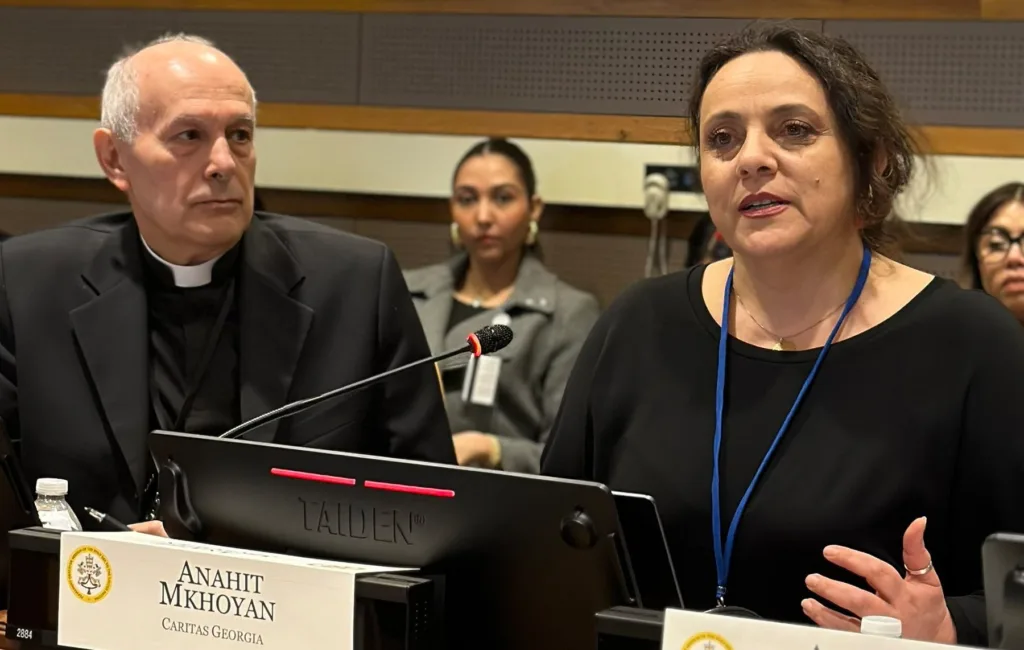
by Gina Christian, OSV News
(OSV News) — Efforts to pass a Russian-style foreign agent law could end up restricting the work of the Catholic Church in the nation of Georgia, the leader of an aid agency told OSV News.
“I worry,” said Anahit Mkhoyan, executive director of Caritas Georgia, part of Caritas Internationalis, the universal Catholic Church’s global federation of more than 160 humanitarian organizations.
As a locally registered nongovernmental organization, Caritas Georgia is “the biggest social service provider” in the nation and also “invests a lot into the development of social protection systems,” she said.
But that reach is now threatened by a renewed push to enact Georgia’s proposed “Transparency of Foreign Influence” legislation.
The bill, which had been shelved last year after it sparked violent protests, has been dusted off and reintroduced by the leading Georgia Dream party — whose de facto leader, former Prime Minister Bidzina Ivanshvili, is seeking a Moscow-facing path for the nation, which gained its independence from the Soviet Union in 1991.
The text of the bill specifies that organizations, activist groups and media outlets receiving more than 20% of their funding from abroad must register with Georgia’s government as “agents of foreign influence.” After 83 members of Georgia’s parliament approved it April 17 — amid a brawl of protest that broke out in the legislative chambers — the bill has advanced to a second reading by lawmakers.
Mkhoyan said the current document is “the same” as its predecessor — as are the resulting protests and the bill’s implications.
“The reality is that (such) laws exist in many Western countries,” she told OSV News. “But this law is very vague, and it may give the government permission to interfere with your actions without reason, and shut you down because of this unrestricted power over organizations that receive more than 20% of their income from other countries.”
Mkhoyan said she believed the law is specifically designed “to influence news agencies, media and civil society organizations” dedicated to “democracy, civil society development and human rights.”
The attempt to “take control” of such entities is flatly undemocratic, she said, since “you need to be open to talk about (issues) with your people and not restrict their actions.”
The U.S. State Department echoed those concerns, saying in an April 18 statement that it was “gravely disappointed” by the “Kremlin-inspired” legislation, passage of which “could compromise Georgia’s progress” on the path to European Union membership.
“If adopted, the proposed legislation could limit freedom of expression, stigmatize organizations that deliver these benefits to the citizens of Georgia, and impede independent media organizations working to provide Georgians with access to high quality information,” said the State Department.
The bill’s backers “do not understand that they are putting all the organizations into one pot,” and social service organizations will be severely hampered, said Mkhoyan.
“There is no mention about social services that are provided by nongovernment organizations. . . funded by donations from other countries,” she said. “Basically, (the bill’s proponents) disregarded this area.”
At the same time, the foreign-funded work of Caritas Georgia saves the nation’s government significant resources, Mkhoyan said.
“For the last three years, 68% of our funds came from international organizations,” she said. “But these funds are directly going to the service of the poor. We take care of the Georgian people, we take care of Georgia’s children, we take care of poor areas of Georgia. Basically, we invest all this money into the work that needs to be done.”
Along with practical humanitarian assistance, the bill stands to curtail what Mkhoyan says is an equally important part of Caritas Georgia’s mission.
“The second area that will be hurt gravely is the advocacy that we are doing,” she said. “Basically, now we have a pretty powerful voice, because we do not receive (our) entire funding from the government. We have balanced funding. . . from the government and also international organizations. Even if we go to 50-50, we still can keep this strong voice on improving social policies, improving the human rights situation for our beneficiaries, for the people who need it.”
But under the foreign agent law — which could still be enacted, despite Georgia President Salome Zourabichvili’s promised veto “if they do not like something that Caritas says — for example, that we want to change something in the social policy or build up another system in the social system which will work — then they can just shut us up and put us in place, saying, ‘You’d better be careful. If not, you may have bad results,'” said Mkhoyan.
She noted that “the churches themselves are in danger if this foreign law passes, because they are receiving a lot of donations from abroad.”
Mkhoyan, a native of Armenia, told OSV News that her all-Georgian staff has joined Catholic priests at the public protests against the foreign agent bill.
Those demonstrations “are becoming pretty violent,” she said. “Yesterday, there was even an ultimatum (given) to the crowd that if they did not go away, (police) would use water (cannons) and pepper spray.
“Georgian people are struggling for their rights and for their country,” said Mkhoyan. “I’m proud of the people, that they are fighting for that.”






